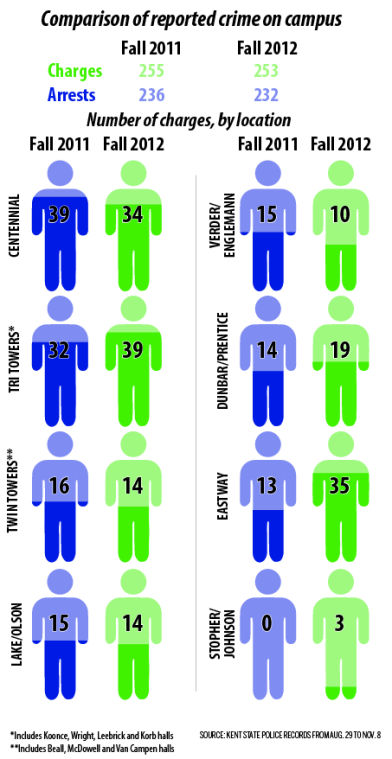Tri-Towers have had the most criminal charges this year, alcohol-related arrests dominate
According to an analysis of Kent State University Police Services incident reports from the first 10 weeks of classes, campus-wide arrests have stayed virtually the same since last fall, with only four fewer arrests and two fewer charges.
Tri-Towers reported the most charges, with 39, overtaking Centennial Courts, which reported the same number of incidents as the highest crime spot on campus in 2011.
Campuswide, underage drinking decreased 24 percent from last fall during the same reporting period, while drug possessions increased 38 percent.
Community Resource Officer Michquel Penn said the most common areas for on-campus arrests are usually those with more freshmen and sophomores who are new to the university and may not take things as seriously.
Arrests in Eastway nearly tripled from last fall, charges of underage drinking doubled and drug possessions tripled.
“Any time you have a large number of people in one area, there is a chance for incidents to occur,” she said.
However, she said because of the frequent turnover rate for residence halls, the number of incidents inevitably change from year to year.
In Fall 2011, Dunbar Hall reported only one incident of crime but increased to 14 incidents in 2012. The increase is mainly due to 10 charges of underage drinking.
However, Prentice Hall showed a 62 percent decrease in crime during fall of 2012 because of a decline in underage drinking charges.
Michelle Mullen, sophomore criminology and justice studies major, currently lives on the third floor of Dunbar. She said the increase in arrests isn’t surprising to her because some residents “act like they don’t care if they get in trouble.”
“On Halloween, there was a fight on my floor,” she said. “It was kind of scary. I kind of hid away from it because I didn’t want to be a part of it at all.”
Mullen said she thinks the security in Dunbar is adequate and is thankful that the security aides enforce noise violations, but she is unhappy with the lack of action by resident assistants when security is not around.
Brian Hellwig, assistant director of Residence Services, said overall he thinks the patrol of residence halls is sufficient.
“I’m comfortable with the staffing patterns,” he said. “We do five or six rounds per night, per building, as well as the resident assistant and the police doing rounds.”
However, when crime patterns appear, Hellwig said he increases the number of rounds the security aides conduct in those areas. An example would include the recent arsons in Prentice Hall where Hellwig increased security to “be more visible,” hoping to deter any further incidents.
“I think overall the residence halls are a pretty safe place,” he said. “I think we have ample security coverage.”
Although most of the reported crimes on the Kent campus are minor issues such as underage drinking, police records indicate more serious incidents often occur in certain dorms.
One charge each of receiving stolen property and misuse of a credit card and two charges of criminal damage occurred in Centennial this semester. As crime in Tri-Towers increased by 22 percent in 2012, the charges were again more serious with one count each of criminal damage and criminal trespassing. Disorderly conduct charges more than tripled since 2011.
The Rockwell Hall parking lot and the intersection of East Main Street and Lincoln Street were among the most common locations for underage drinking.
Penn explained the reason these areas are home to so many arrests is they are primary locations for students who are walking back to their dorms from bars or house parties.
Parking lot charges accounted for 15 percent of all charges this fall, up from 10 percent last fall. Offenses ranged from underage drinking, criminal damage and obstructing official business, among others.
Penn said she thinks many students have a misconception of what college should be about.
“Some students come with the stereotype that that is what college is about – partying and getting intoxicated in the process — when it’s not,” she said. “It’s not the norm for everybody. If you look at the number of incidents that are reported compared to the thousands of students who attend the university, they are actually in the minority.”
Contact Amanda Crumm at [email protected].
For more information on check out TV2’s report on Residence hall crime rates.



